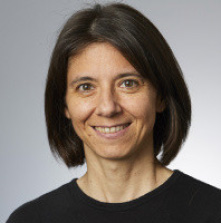Establishing a new structure to support decision-making and strategy
Last week, the ABE school's Faculty Board held its third meeting.

Luigia Brandimarte , teacher member of the board, describes how the board is in a scouting phase, working on establishing a new organisational structure to support their work going forward.
“I tend to be proactive so waiting is difficult, but this time it truly feels important, and necessary, to spend some time developing the structure to give us the best conditions going forward. We are in a way still figuring out our role at KTH and the school. The experience of colleagues and existing knowledge of the organisation is really crucial to get us the understanding and support on how to proceed. The administration is also available to offer support with our activities, which is great.”
The third meeting combined formal decisions and discussions on the organisation and structure.
“As with previous meetings, we had a packed agenda with several decisions to handle, including new doctoral courses and an updated subject syllabus for the doctoral programmes for Philosophy and Transport Science. We continued the
discussion on how to get more time for strategic questions, including ways to delegate more. This meeting, our two new external members also joined us for the first time. It will be interesting to get their input on the more strategic questions going forward. Everyone in the board is very committed and there is a real, strong intention to do good for the ABE school.”
In the second half of the meeting, the Director of First and Second Cycle Education (GA) and the Deputy Director of First and Second Cycle Education (Deputy GA), as well as the Director of Third Cycle Education (FA) and Deputy Director of Third Cycle Education (Deputy FA) joined. They presented an overview of current boards, councils and working groups handling the quality of education at ABE and proposals for suggested future organisations.
“With the Faculty board in place, there is a need to figure out how to best organise the preparation and handling of decisions going forward and how we can structure the work. We also need to develop a clearer picture of what future preparatory bodies are expected to deliver to the Faculty Board. It was very interesting to get a deeper understanding of the current organisation and flow of information related to the quality of education within the school as well as the suggestions for a new organisation. The discussions will continue during our next meetings.”
The Faculty Board has begun a couple of initiatives to reach out and create dialogue with staff at the school. The teacher representatives of the board will visit all the departments during for example a departmental meeting. Luigia tells more:
“The aim is to introduce us teacher representatives and learn more about what each department expects from the board and any issues they want us to discuss or know about. We had our first visit to the Department of Philosophy and History on 8 April. Next visit will be on Friday 19 April at the Department of Urban Planning and Environment. We will also have an ABE school meeting on 22 May where we have invited the school’s faculty over lunch to discuss the concept of collegial influence in relation to the establishment of the Faculty Board. We’re interested in the needs regarding flow of information to and from the board, department and staff and when and how we can collaborate. We want to listen to the needs of the ABE faculty.”
